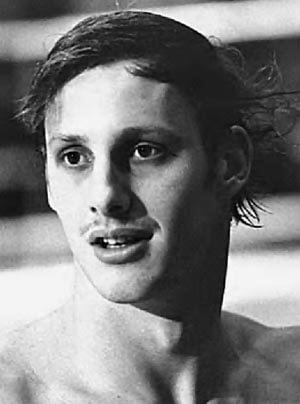First Man Under 50 Talks About Progression from Olympian to Masters Swimmer

By Jeff Commings
TUCSON, Arizona, November 29. WHEN Jim Montgomery won the gold medal in the 100-meter freestyle at the 1976 Olympics, he earned his own page in swimming's history books.
On that day – July 25, 1976 – Montgomery became the first man to break 50 seconds in the event, doing so by the slimmest of margins: 49.99.
On the surface, Montgomery achieved his goal of dipping under the magic mark. But because the swim was the last event on an eight-day Olympic schedule, Montgomery said he was unable to approach his true goal time.
"I thought realistically I could swim 49.4 or 49.5," Montgomery said. "I had some relay splits that were that fast at that time, and back then we didn't have the fancy relay starts they do now."
More than 30 years later, Montgomery, now 52, said his mind rarely wanders to that history-making swim.
"I just look at the whole Olympic experience, not just the one race," he said. "I got turned on watching other sports and other athletes."
It would be wrong to simplify Montgomery's life to that single accomplishment, even if it was a mind-blowing swim. Certainly, it is a major reason he was inducted to the International Swimming Hall of Fame in 1986, but there is a long list of accomplishments that can equally inspire.
He was a five-time gold medalist at the first world championships in 1973, winning the 100 and 200 frees, as well as swimming on all three relays. He couldn't achieve the same feat at worlds in 1975, blaming overtraining for a run at a sub-4:00 400-meter free in 1974.
"If I didn't have that training failure in '74, I wouldn't have become Olympic champion," Montgomery said. "I was stronger and handled the power training necessary for the 100 free."
He was an All-American many times over at Indiana University, where he was guided by James "Doc" Counsilman to three wins in the 100 and 200 frees.
Montgomery is too busy – and too lazy, he said – to put much time in the water these days. He is a co-owner of Dallas Aquatics Masters, which he helped create in 1978 "as a sort of hobby," he said, but became a career once he saw the potential to give Masters swimmers the chance to excel. Today, the club trains 700 swimmers for triathlons, pool competitions or simply for fitness.
Since 1998, he's also been the head swim coach at the Greenhill School, where he also works as the aquatics director.
But during an interview recently, Montgomery's voice – a soft-spoken mixture of Texas drawl and Wisconsin nasality – never hinted at any signs of being overworked.
In the midst of his hectic schedule, he's found a lot of time to travel, which is what boosts his spirits — along with his wife, Diane, and five children.
Getting to this stage in his life didn't come as easily as Montgomery expected. Most Olympians are able to move on with ease into the "real world," while others take steps for another shot at Olympic glory. After returning from Montreal, Montgomery still had one more year at Indiana, and he managed to place second in the 100 free and third in the 200 free at NCAAs.
When 1978 rolled around, Montgomery found himself burned out on the sport after winning a silver medal in the 100 free at world championships. After a six-month break, he returned to the IU pool to lose the 25 pounds he'd gained in preparation for a series of teaching clinics.
"I was training the best I'd ever done in my whole life," he said.
When his father became terminally ill in the middle of training for nationals, the strain of caring for his father slowly took its toll on Montgomery. After his father died, Montgomery found little to no drive to continue in the sport.
"I lost my desire to keep going, even though I tried to make a little comeback for the 1980 Olympics, but once they announced the boycott I pretty much lost all my incentive," he said.
And, as most elite swimmers do when they retire from the sport, Montgomery struggled to define himself as more than an Olympic champion.
"I think everyone goes through that period," he said. "You just sit back and wait for things to come to you. I don't care if you're an Olympic champion, but that doesn't happen."
After brief stints working for swimwear companies in Europe and Japan, Montgomery was urged to start Dallas Aquatics Masters in 1981 with former Southern Methodist University standout Bobby Patten. More than 25 years later, Montgomery is still expanding his ideas on adult fitness. He's co-authoring a book with Mo Chambers called "The Complete Guide to Masters Swimming." The book will be geared for the "intermediate" swimmer, who Montgomery said has the basic knowledge about swimming but is unprepared to race in a pool or open water. It is expected to be published next summer.
In the meantime, he's got to squeeze in some more training time to get into shape for next April's FINA World Masters Championships in Perth, Australia, and Masters nationals, which will be held the following month in Austin, Texas.
"Hopefully I've got some gas in my tank," he said. "The passion to train half as hard as I did isn't there, but that's OK. I really enjoy the camaraderie and travel now."



